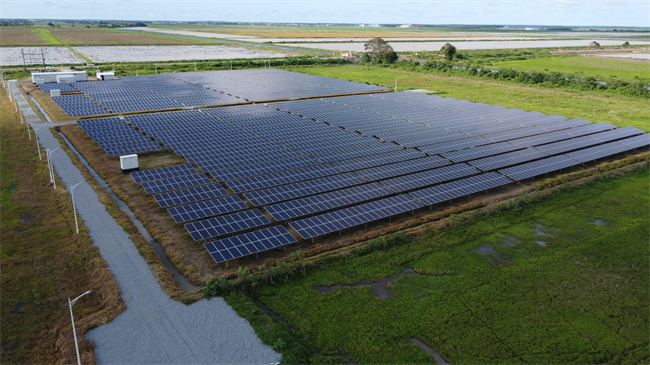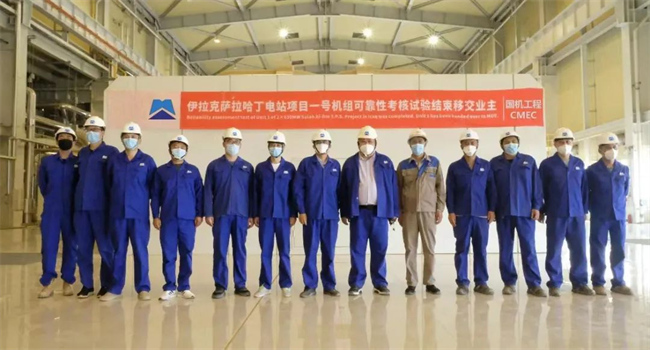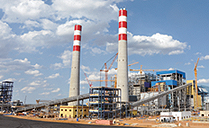BRI projects bring significant gains for participating countries
(sinomach.com.cn)
Good development benefits all. More efforts are called for in the high-quality growth of the Belt and Road Initiative to inject fresh momentum into global economic development and people's well-being. Sinomach is one of the largest contributors of China's overseas projects, especially in the areas of infrastructure, industrial facilities and modern agriculture.
Chinese-proposed plans such as the Global Development Initiative, or GDI, and the Belt and Road Initiative, or BRI, are providing both a reliable guide and concrete benefits for developing countries striving to realize economic modernization.
Intelligent microgrid system powers Suriname
Two power plants, both equipped with a microgrid that integrates photovoltaic cells, diesel generators and energy storage systems, recently started grid-connected power generation in the Nickerie and Coronie districts of Suriname.
A ceremony was held to celebrate the smooth operation of the plants. Chan Santokhi, president of Suriname, Ronnie Brunswijk, vice president of Suriname, and Han Jing, Chinese ambassador to Suriname, addressed the ceremony.

An aerial photo of the photovoltaic cells of the power station that introduces an intelligent microgrid system in Suriname, undertaken by SUMEC CEEC [Photo/SUMEC]
A microgrid is a self-sufficient energy system that serves a discrete geographic footprint, such as a college campus, hospital complex, business center or neighborhood. Within microgrids are one or more kinds of distributed energy sources (for example, solar panels, wind turbines, combined heat and power generators). In addition, many newer microgrids contain energy storage, typically in batteries.
The two plants were designed and supplied by Sinomach affiliate SUMEC Complete Equipment & Engineering Co (SUMEC CEEC). Construction started in February 2020, and the plant has now been put into operation after two years of efforts.
Microgrid systems facilitate remote applications and allow access to pollution-free energy. Suriname, located in northern South America, is one of only three negative carbon emitters in the world and is transitioning to a sustainable economy.
The project is an important step made by Suriname towards sustainable development. Once operational, it will provide reliable green energy for local residents and industrial development, benefiting more than 30,000 people in surrounding areas.
CMEC gas-fired power project halfway to completion
The Saladin power station, also known as the Salah Al-Din power station, is a 1,260-megawatt (MW) gas-fired power plant under construction in Saladin, Iraq. The plant, which was undertaken by Sinomach subsidiary China Machinery Engineering Corporation (CMEC), includes two 630MW oil-gas fired units. Its first unit has passed a 720-hour reliability test.

The project members of Saladin power station pose for a group photo in celebration of the successful examination and delivery. [Photo/CMEC]
As the largest power project in Iraq, the operation of the first unit has solved local power shortages. CMEC has tried its best to ensure the plant's construction, which has faced many challenges, including terrorist attacks and the impact of COVID-19.
Now the project team is summing up the experience of building the first unit and striving for the smooth handover of the second unit, building a signature project of China-Iran cooperation under the BRI.
SINO-HEAVYMACH participates in Uzbekistan's 2-million-ton steel making project
Sinomach subsidiary China National Heavy Machinery Research Institute Co Ltd (SINO-HEAVYMACH) has joined hands with Uzbekistan Azia Metall Prof LLC (AMP) on a steel making project with an annual output of two million tons.
SINO-HEAVYMACH will be tasked with the design, engineering and supply of a factory integrating an electric arc furnace, a secondary refinery and continuous casting production lines.
The project is the first short-flow steel making project under the Belt and Road Initiative with a yearly output exceeding one million tons in Central Asia. It will accelerate the progress of Uzbekistan's industrialization and pave the way for further developing the China-Uzbekistan comprehensive strategic cooperative partnership.

 R&D and Manufacture
R&D and Manufacture Project Contracting
Project Contracting Trade and Services
Trade and Services




